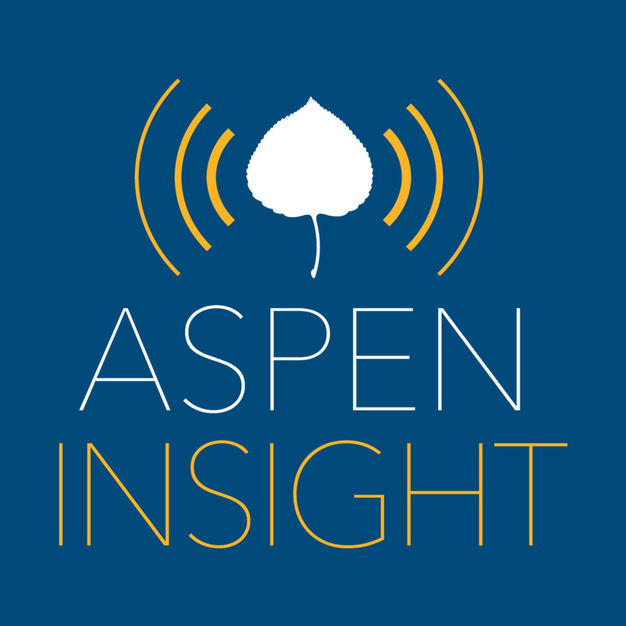
Aspen Ideas to Go
The Aspen Institute
Aspen Ideas to Go is a show about big ideas that will open your mind. Featuring compelling conversations with the world’s top thinkers and doers from a diverse range of disciplines, Aspen Ideas to Go gives you front-row access to the Aspen Ideas Festival and other events presented by the Aspen Institute.
- 55 minutes 42 secondsA Radical Vision: Art for All in America
Millions of children across America don’t have art classes in school and don’t grow up going to art museums and galleries. They might be hours away from the closest museum, or their families might not have the means to bring art into their lives. Philanthropist Alice Walton had that kind of childhood, and wants to prevent as many people as possible from repeating it. When she discovered the art world as an adult, she also learned how insular and urban it was, leaving out so many. These experiences led her to found the Crystal Bridges Museum of American Art in Bentonville, Arkansas, which opened its doors to all in 2011. Admission at Crystal Bridges is free, and Walton has also instituted educational programs that cover the costs of bringing children in from around the region. Anne Kraybill is the CEO of a related program called Art Bridges, which is attempting to spread the philosophy of art for all and help smaller museums around the country increase access to art. In this talk from the 2024 Aspen Ideas Festival, Ford Foundation president Darren Walker interviews Walton and Kraybill about these initiatives and the motivations that created them.
15 January 2025, 11:58 pm - 57 minutes 32 secondsMexico’s Drug Cartels and America’s Opioid Problem
The extremely wealthy and powerful drug cartels in Mexico operate with near-impunity, perpetuating violent crime and terrorizing Mexican citizens. But they also bring pain and suffering to the United States by importing massive amounts of fentanyl, fueling the deadly opioid epidemic. Drug lords saw an opening after the U.S. government finally stepped in to stop the flow of prescription opioids created by the pharmaceutical industry. A ready-made market of addicted people just over the border provided incentive, and fentanyl was cheaper and easier to produce than other drugs. Anabel Hernandez, a Mexican journalist who’s covered the cartels for more than two decades, joins former assistant U.S. attorney Sherri Hobson for today’s talk from the 2024 Aspen Ideas Festival in June. Hobson went after traffickers on the border from the San Diego office for 30 years and prosecuted hundreds of smugglers. The two break down the timeline of the fentanyl crisis and share the insider information they spent years building up from either side of the border. Reuters editor in chief Alessandra Galloni moderates the conversation.
8 January 2025, 11:00 am - 44 minutes 49 secondsThe Science of Groupiness (Encore)
This episode is from the 2022 Aspen Ideas Festival, but we’re bringing it back because it’s still as relevant as ever. Though it can sometimes feel like conflict and discord is human nature, our brains are actually predisposed to forming groups and working together. In our individualistic society, we may think our minds stop at our skulls, but when people come together and connect effectively, they actually think in different ways, and they all become smarter and healthier together. Science writer Annie Murphy Paul, the author of “The Extended Mind: The Power of Thinking Outside the Brain,” joins NYU psychology professor Jay Van Bavel for a participatory conversation about uniting people to solve problems and work towards common goals. Again and again, research demonstrates the power of groups, and the panelists help us translate these findings into practical tips for encouraging people to collaborate functionally. New Yorker writer Charles Duhigg moderates the conversation and takes questions from the audience.
1 January 2025, 5:43 pm - 56 minutes 21 secondsSir Ken Robinson on Being in Your Element
Sir Ken Robinson believed that as a society, we tragically underestimate and underutilize human ability. We create linear systems for our minds modeled on industry and manufacturing, and we fail to honor the nonlinear imagination and creativity inside all of us. As a speaker and educational advisor, Robinson worked with people all over the world in various sectors and settings on helping them reconnect with their natural inclinations and aptitudes. He advocated for educational reform that treated children as individuals motivated by interests and passions. Robinson unfortunately passed away in 2020, and this episode is from our archives. He gave this timeless talk at the 2010 Aspen Ideas Festival.
18 December 2024, 9:53 pm - 57 minutes 49 secondsHistory, Justice, and Amends: Britain’s Legacy of Slavery
Scholars are still uncovering information about Britain’s involvement in the transatlantic slave trade and its era of slavery, piecing together how the wealth generated from these atrocities shaped the nation’s history. For some descendants, this means just now learning about their families’ roles in and benefits from these horrors. In Britain, a few horrified heirs and private institutions are stepping forward to make amends, but there are few models for what meaningful reparations or restorative justice could look like. Where do we go from here, and what would truly make a difference? In this conversation from the 2024 Aspen Ideas Festival, the three panelists bring personal and academic experience to this weighty conversation. Harvard historian Vincent Brown, British TV presenter and historian David Olusoga and former BBC journalist and reparations advocate Laura Trevelyan discuss the meaning and practical application of reparations and restorative justice. New York Times editor Dean Baquet moderates the talk and takes questions from the audience.
11 December 2024, 12:00 pm - 43 minutes 20 secondsThe Invisible Danger of Extreme Heat
Each year brings more destructive natural disasters and growing evidence of the challenging future we face if we don’t address climate change. But the biggest cause of climate-related deaths is one that’s hard to see and hardly talked about. Extreme heat killed more than 2,000 people in the United States in 2023 and put intense stress on millions as they faced high costs of utilities and numerous life interruptions. Federal, state and local policy hasn’t kept up with rising temperatures and the scale of the heat threat, and cities are scrambling to adapt and prevent more deaths. In this panel from the 2024 Aspen Ideas Festival, the chief heat officer for Miami-Dade County, Jane Gilbert, joins the chief heat officer for the city of Los Angeles, Marta Segura, to share their learnings and innovations in these brand new positions. Rolling Stone journalist Jeff Goodell, the author of “The Heat Will Kill You First,” brings a wider lens to the issue. NBC News correspondent Liz Kreutz moderates the conversation.
5 December 2024, 5:14 am - 59 minutes 36 secondsWhat is Missing in the Lives of America’s Young People?
Young people in America are struggling. The causes are varied and may not be entirely clear, but the results are unfortunately unmistakable. Many of our youth feel lonely, isolated or depressed and struggle to see a future where they can buy a house, have a family or feel connected to their community. The two panelists in this talk from the 2024 Aspen Ideas Festival bring a distinct expert perspective, filling out the picture of how to come to the aid of young people and prevent these patterns from repeating. The U.S. Surgeon General Vivek Murthy has issued advisories on the youth mental health crisis and raised the alarm about social media use. Kaya Henderson is the executive director of the Center for Rising Generations at the Aspen Institute, after spending years as an educator and entrepreneur. Both see the need to address this problem holistically and see kids as more than future workers. Former university administrator Dan Porterfield, now the president and CEO of the Aspen Institute, moderates the conversation.
21 November 2024, 5:08 am - 51 minutes 49 secondsCan We Use the Past to Guide an AI Future?
New technologies have always led to changes in society, though not always as quickly or drastically as people feared. Could artificial intelligence be different? Instead of letting a new AI reality unfold amid helpless hand-wringing, what if we tried to learn from the past? In this talk recorded at the 2024 Aspen Ideas Festival, a panel of thoughtful technology experts from various perspectives meet to discuss what might happen in a future AI-infused world. They explore the possibilities between immediate havoc and the eventual end of humanity, and suggest actions we can take to get the outcome we want. UK historian, writer and TV presenter David Olusoga joins UK government technology advisor Karen McLuskie and tech philanthropist Vilas Dhar of the Patrick J. McGovern Foundation. The executive director of Aspen Digital at the Aspen Institute, Vivian Schiller, moderates the conversation.
13 November 2024, 11:00 am - 46 minutes 5 secondsA New Leash on Life: How Can We Help Our Dogs Live Longer?
Research on aging and extending life and healthspan has ventured beyond humans to our best animal friends – dogs. In less than a year, dog owners may be able to buy a drug that would extend their dog’s life and hopefully keep it healthier for longer. Especially for owners of big dogs with short lifespans, this could be welcome news. And what the drug developers learn about dog aging might contribute to learnings on human aging. Scientists are also building some of the first long-term studies on dog health that will provide detailed information and important insights on our pets’ lives, and maybe our own. Neuroscientist Celine Halioua founded her company Loyal when she was just 24, and is close to getting FDA approval for the company’s first drug. Daniel Promislow, a biogerontologist at Tufts University, founded and leads the Dog Aging Project, collecting data on dogs across the country from all walks of life. The Aspen Institute’s executive vice president, Eliot Gerson, moderates this feel-good conversation recorded at the 2024 Aspen Ideas Festival in June.
6 November 2024, 4:36 pm - 33 minutes 6 secondsJane Fonda, Rebel With a Cause
After a lifetime of successful acting and passionate activism, Jane Fonda is far from done. At 86, she’s now pouring all of her efforts into pushing for action that will stop climate change, and she’s willing to put it all on the line for this fight. From protesting and getting arrested in DC to talks and appearances across the country, Fonda is lending her famous face and using her platform every chance she gets to ensure our planet has a future. Her latest book, from 2020, is called “What Can I Do? My Path From Climate Despair to Action.”Journalist Katie Couric interviews Fonda at the 2024 Aspen Ideas Festival about this stage of her life and activism. Their conversation was recorded in June.
31 October 2024, 3:00 am - 54 minutes 6 secondsWhite Poverty
Many more Americans are struggling to survive and make ends meet than is typically portrayed in the media and public policy debates. And when poverty is depicted, harmful and inaccurate stereotypes often contribute to divisiveness rather than sympathy. Outdated measurement systems and unrealistic living standards have artificially kept U.S. poverty rates low over the past few decades. But Reverend William Barber II and his colleagues at the social change organization Repairers of the Breach have worked to correct the data and popularize the true scale of the problem. About 135 million people, or roughly 40% of the country, are considered poor or low wage, which means making less than $15 an hour. And in his book released earlier this year, “White Poverty: How Exposing Myths About Race and Class Can Reconstruct American Democracy,” co-written with Jonathan Wilson-Hartgrove, he tackles misconceptions about race and poverty that keep people divided and powerless. The myth that all poor people are Black hides reality and exploits racism to ensure that nothing changes. In this talk from the 2024 Aspen Ideas Festival in June, Barber talks with longtime public servant and former mayor of New Orleans, Mitch Landrieu, about what poverty really looks like and why the issue has been so distorted.
23 October 2024, 10:13 pm - More Episodes? Get the App
Your feedback is valuable to us. Should you encounter any bugs, glitches, lack of functionality or other problems, please email us on [email protected] or join Moon.FM Telegram Group where you can talk directly to the dev team who are happy to answer any queries.
 Scholars Strategy Network's No Jargon
Scholars Strategy Network's No Jargon
 After the Fact
After the Fact
 Aspen Insight
Aspen Insight
 Innovation Hub
Innovation Hub
 92Y Talks
92Y Talks